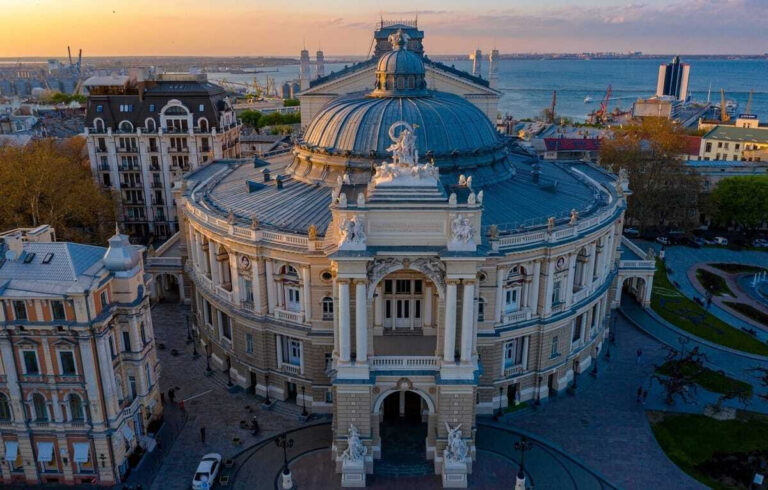On April 22, an international United Nations conference was held in Odessa, hosted by Jan Shapiro of the Odessa Regional Development Authority, to promote the future of Ukrainian tourism and how to attract international investment in this sector, especially in the Odessa region. We discussed whether to invite it to The 20 speakers included local tourism business leaders and foreign experts.
It may seem crazy to talk about international tourism and investment in Odesa, where Russian drone and missile attacks are constant. But while we wait for the end of the war, it is useful to start talking about development opportunities and ways to attract foreign investors today. It is important to remember that tourism is an industry that creates many jobs.
The Russian invasion put Ukraine in the spotlight of the international press and, from a marketing point of view, provided great publicity for the country and its cities. Additionally, large foreign investors are interested in rebuilding the country.
Expanding the Odessa brand
As for Odessa, its strategic role as the maritime capital of Ukraine and its reputation as a city of art constantly attract more attention from the foreign press than the capital Kiev. In fact, during the war, thanks to technical assistance from the Italian Ministry of Culture, Odessa’s historic center was inscribed on the UNESCO World Heritage List.
The city is named after a collection of music (the 1969 Bee Gees album), books (Frederick Forsyth’s novel The Odessa Files, 1972), movies (Little Odessa, 1994), fashion, design, and cosmetics. . There are at least a dozen Black Sea city-themed properties in the United States (Odessa, Texas being the largest), one in Canada, and one in Brazil. Finally, many women around the world are named after Ukrainian cities, like Australian actress Odessa Young.

Other interesting topics
All-out defense: How can Ukraine protect its economy and energy sector during all-out war?
In this new episode of Talking Substance, host Alina Hrytsenko interviews BUCC’s Jock Mendoza Wilson about Ukraine’s EU trade, energy security, and future.
These two elements of marketing, advertising and branding will have a significant impact on the flow of tourists to the ‘Pearl of the Black Sea’ in the post-war period.
However, Odesa is not yet ready to take full advantage of this future international tourism trend due to its Soviet-style economic paradigm. In fact, the city only has commercial activities during the summer season. The beach club opens in early June and closes in the first week of September. All major international events take place during the summer. However, from October to May, the city is closed and travel companies cut staff to save for the next summer season. The city offers the classic services of beach tourism: hotels, restaurants, beach clubs and discos. However, despite its cultural heritage, it does not offer active cultural tourism all year round, even in autumn, winter and spring. Europe’s major tourist destinations, Paris, Venice, and Prague, are visited by people in all months of the year.
Therefore, the challenge for Odessa, and for Ukrainian cities in general, is to organize monthly events even during the low season and update museums and cultural facilities for foreign tourists. The aim is to spread the flow of tourists to other months, allowing Ukrainian operators to work more during the off-season. Moreover, according to international statistics, the average cultural tourist spends twice as much as a beach tourist. However, the most profitable sector is congress tourism (meetings of industrial and professional sectors), with expenditures up to four times higher.
expert opinion
To overcome these challenges, Miguel Martín, an award-winning startup investor mentor from Spain, provided Odesa tourism operators with free consulting to develop innovative tourism projects . He declared his readiness to support Ukrainian entrepreneurs, innovators and their start-ups to gain international visibility and investment opportunities. Anyone can contact him through the UN conference organizers.
Of particular interest was a speech by Toronto’s Dan Christian, Managing Director of the Acceleration Team and founder of the Travel Trends Podcast, who explained new trends in international tourism.
“A journey based on passion.” People travel according to their passion. The purpose of traveling is no longer to see places, but to find something that matches your hobbies (for example, yoga travel, which is growing rapidly). “New Inspiration” Social influencers who create fashion and trends have a huge impact on bookings. Therefore, competitive tourist resorts need content creators to attract lovers of specific activities (e.g. organizers of couples dance festivals or marathon competitions) “Destination marketing is evolving.” Gastronomy ( There are growing trends in tourism areas such as (both signature cuisine and wine), wellness and sports. Many tourists travel for spas and beauty treatments. Some people like to play sports (diving, golf, paddling) on their days off. ‘Effective Storytelling’ Tourism is driven by exciting stories, such as the lives of famous people (George Clooney bought a holiday home on Lake Como), movies filmed in the city, and international best-selling books.
The lesson for Odesa is that if tourism facilities do not adapt to these trends, tourism will experience an initial peak driven by the curiosity of war propaganda, and then decline in favor of better-equipped tourist destinations. It means being deaf.
From a gastronomic point of view, wine producer Eduard Gorodetsky, honorary consul of France in Odesa, speaks out and recommends investing in events promoting Ukrainian wine and the typical cuisine of Odesa and the neighboring Bessarabia region. did. Many people travel to try new wines and specialties.
Regarding the wellness/beauty farm sector, Odesa has a historical heritage of healing waters and mud, and luxury spa centers were created as early as the 19th century. This tradition was continued in Soviet-era sanatoriums. This is an interesting area for international investment, with the potential to modernize aging structures that are still active.
However, simply increasing international events is not enough. Work also needs to be done by public administrators. For example, if a museum in the city wants more foreign visitors, it should introduce electronic tickets and provide digital guide services via smartphones. Additionally, cities that are attractive to foreign tourists need local police who speak English and other languages. Foreign tourists who are robbed or scammed at a restaurant and charged an astronomical amount of money must be able to receive a copy of the police report written in their own language in order to receive insurance coverage. not.
In conclusion, to take advantage of the huge opportunities for tourism in Ukraine, there is a need to revolutionize the traditional approach to services, especially in cities like Odessa, which have hitherto been fossilized by low-cost beach tourism. But to start a revolution, we need not only new ideas, but also new heads. Odesa has received significant contributions from European entrepreneurs and has had Italian, French, British, German and Greek mayors. Having a foreign manager lead the tourist center of Odesa city and region would be a wise choice and at the same time be in line with its historical traditions.

